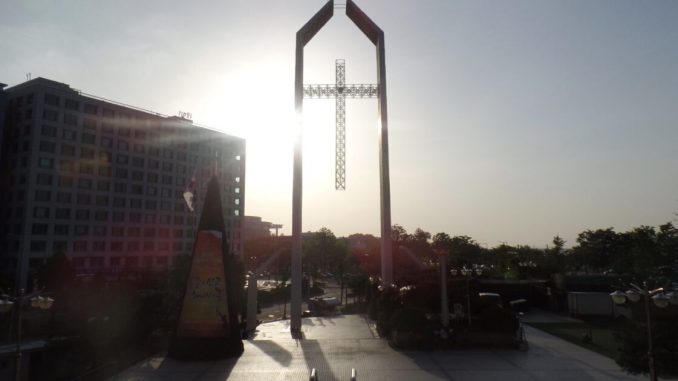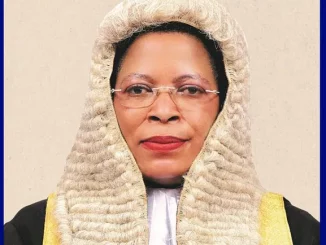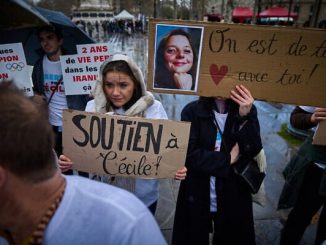
Yoido Full Gospel Church Outdoor Cross
| Published August 28, 2025
In a move that has sparked national and international concern, South Korea’s new administration under President Lee Jae-myung has launched a series of raids on prominent Christian churches and media institutions. Framed as law enforcement actions, these raids are being interpreted by many as politically motivated attacks aimed at silencing dissenting voices loyal to former President Yoon Suk-yeol and the conservative movement.
Targeting the Faithful
Among those raided were Sarang Jeil Church, led by outspoken pastor Jun Kwang-hoon; Segyero Church; Unjeong Chamjon Church; and the globally recognized Yoido Full Gospel Church. Authorities also targeted Far East Broadcasting, a Christian media outlet with a wide audience across Asia.
While officials cite election law violations, lobbying, and even incitement as grounds for the investigations, critics argue the charges are vague and serve as a pretext to dismantle influential centers of opposition. The raids coincided with ongoing protests challenging the impeachment of former President Yoon, protests in which many church leaders and congregants played a visible role.
Case 1: SaRang Jeil Church (Rev. Jeon Kwang-hoon)
On August 5, police raided Rev. Jeon’s residence, church, and media studio, citing allegations that he incited the “Seobu Court riot” in January.
Reality: The event in question occurred hours after Jeon had already ended his rally.
Church stance: Jeon insisted, “I am an emeritus pastor, not even in a position to give such orders.”
Criticism: The raid was not about genuine evidence but about punishing a pastor whose church spearheaded anti-impeachment protests.
Case 2: Segyero Church (Rev. Son Hyun-bo)
On May 12, police stormed Rev. Son’s office and even seized his personal phone, citing alleged election law violations. His crime? Hosting a candidate for a discussion ahead of the Busan superintendent of education by-election and uploading the video online.
Church stance: Over 1,200 Christian and civic groups immediately gathered at the National Assembly, calling the raid “unprecedented religious persecution.”
Their point: Son never told congregants whom to vote for. He merely urged participation. Using microphones in a 5,000-seat sanctuary was treated as if it were unlawful campaigning.
Criticism: A blatant overreach. The state reinterpreted normal pastoral duties as criminal acts.
Case 3: Unjeong Chamjon Church (Rev. Ko Byung-chan)
Just two weeks later, on May 26, Unjeong Chamjon Church was raided alongside Segyero.
Church stance: Leaders decried that police intruded during worship and even seized pastors’ personal devices. “This is not mere procedure—it destroys the sanctity of the church itself.”
Criticism: Crossing the threshold into active worship space represents a dangerous precedent. Once the sanctity of the pulpit is violated by the state, no faith community is safe.
Case 4: Yeouido Full Gospel Church (Rev. Lee Young-hoon)
On July 18, prosecutors raided the world’s largest Pentecostal church and Rev. Lee’s home. The pretext: alleged “lobbying” for a former Marine Corps commander implicated in the controversial death of a soldier.
Rev. Lee’s response: “I never even received a prayer request related to the case. There was no lobbying, no words exchanged with officials.”
Criticism: To drag the nation’s most influential pastor into a political case was to send a chilling message: no church is untouchable.
Case 5: Far East Broadcasting (Rev. Kim Jang-hwan)
The same day, authorities raided Far East Broadcasting, targeting Rev. Kim Jang-hwan, a veteran Christian broadcaster.
Political response: The main opposition party, People Power Party, issued a formal statement: “Raiding revered senior pastors on flimsy grounds is an abuse of power and a violation of constitutional religious freedom.”
Criticism: This case revealed that the raids were no longer “law enforcement.” They had become a naked political tool.
A Threat to Religious Freedom
South Korea’s constitution guarantees freedom of religion, a right that has long been respected even amid turbulent politics. The heavy-handed police actions against Christian institutions raise alarms about whether the government is overstepping its legal bounds. By blurring the line between law enforcement and political suppression, the Lee administration risks eroding trust in both justice and democracy.
International Alarm Bells
The crackdown has not gone unnoticed abroad. Former U.S. President Donald Trump publicly criticized the raids as “very vicious” and warned that targeting religious institutions sets a dangerous precedent. Washington has also expressed unease over a July raid on a joint U.S.–Korea military base that reportedly occurred without American coordination—a move that raised questions about Seoul’s respect for its allies and democratic norms.
Political Power Struggle in Disguise
Supporters of the raids claim they are necessary to address illegal actions by radical pastors and their followers, some of whom have been linked to courthouse unrest earlier this year. Yet opponents say the true aim is clear: to weaken the infrastructure of dissent by intimidating the churches, broadcasters, and civil society groups that provide momentum to the anti-impeachment movement.
By targeting religious institutions rather than addressing dissent through dialogue, the government risks fueling further polarization. The raids may succeed in creating a climate of fear, but they also risk deepening resistance among those who see the measures as an attack not just on political opponents, but on faith itself.
A Moment of Reckoning
South Korea stands at a crossroads. Will it remain a society where religious freedom and political dissent are protected pillars of democracy, or will law enforcement continue to be wielded as a tool of political control? The outcome of this struggle will shape not only the nation’s domestic landscape but also its standing as a trusted democratic partner on the world stage.
For millions of South Koreans—and for religious communities worldwide—the message is clear: today’s raids may be about politics, but tomorrow they could be about silencing faith itself.
 Implications
Implications
1. Political Implications
-
Erosion of Democratic Norms – If law enforcement is perceived as a weapon against political opponents, it weakens faith in democracy and institutions.
-
Chilling Effect on Dissent – Opposition groups, activists, and media may fear similar treatment, leading to self-censorship.
-
Strengthened Polarization – Raids could deepen divides between pro-Yoon conservatives and the ruling party, risking larger protests and unrest.
2. Religious & Social Implications
-
Threat to Religious Freedom – Churches being singled out sends a message that religious institutions aren’t safe from political retaliation, undermining constitutional protections.
-
Faith-Based Mobilization – Far from silencing dissent, the raids may galvanize Christian communities who feel their freedom is under attack, potentially making them more politically active.
-
Public Trust Issues – Citizens may start questioning whether the government truly enforces laws impartially, or if justice depends on political alignment.
3. International Implications
-
Strains on U.S.–Korea Relations – The U.S. is watching closely, especially after reports of raids near a joint military base. Heavy-handed tactics could cause friction with Washington and weaken alliances.
-
Human Rights Scrutiny – International watchdogs and religious freedom groups may step up criticism, painting South Korea as backsliding on democratic values.
-
Geopolitical Risks – South Korea’s image as a stable democracy in Asia is key to its soft power. If that image erodes, it could weaken Seoul’s standing compared to rivals like China.
4. Long-Term Implications
-
Legal Precedent – If tolerated, the raids could set a precedent for future governments to crack down on opposition under legal pretexts.
-
Public Backlash – The more people perceive these actions as political persecution rather than justice, the higher the risk of protests escalating into larger civic movements.
-
Identity Struggle – South Korea may face an internal battle over what kind of democracy it wants to be: one that protects dissent and religious freedom, or one that prioritizes political consolidation at any cost.
 Overall Takeaway:
Overall Takeaway:
The raids on South Korea’s churches mark more than a legal dispute—they represent a defining moment for the nation’s democracy. Whether one views them as justified law enforcement or as thinly veiled political assaults, the implications are profound. If left unchecked, such actions risk eroding trust in institutions, weakening constitutional protections, and casting doubt on South Korea’s commitment to religious freedom.
For the faithful, the message resonates deeply: when the state begins targeting houses of worship under political pretexts, freedom of conscience itself is at stake. For the international community, the raids raise urgent questions about the rule of law in one of Asia’s most important democracies.
South Korea now faces a choice—continue down a path where dissenting voices are silenced under the guise of legality, or reaffirm its founding democratic principles by ensuring that law enforcement serves justice, not politics. The outcome will not only shape its domestic stability but also determine its standing as a nation where freedom, faith, and democracy are truly protected.





Be the first to comment